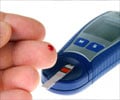Consuming large quantities of sugar-sweetened beverages or indulging in fewer fruits and vegetables may put you at an increased risk of type 2 diabetes, says a new study.
Whereas, eating a low-fat diet does not appear to be associated with any change in diabetes risk, the study added.The three reports have been published in the July 28 issue of Archives of Internal Medicine, one of the JAMA/Archives journals.
In one study, Julie R. Palmer, Sc.D., of the Slone Epidemiology Center, Boston University, and colleagues examined the association between type 2 diabetes, weight gain and the consumption of sugar-sweetened soft drinks and fruit drinks in 43,960 African American women.
In 1995 and again in 2001, the women completed a questionnaire about the types of foods and beverages they typically consumed. A total of 17 percent reported drinking one sugar-sweetened soft drink each day, 32 percent drank one sweetened fruit drink each day and 22 percent had at least one glass of orange juice or grapefruit juice.
Over 10 years of follow-up, 2,713 of the women developed type 2 diabetes. Those who drank more regular soft drinks and fruit drinks-including regular soda, other fruit juices, fortified fruit drinks and Kool-Aid but not diet soda, orange juice or grapefruit juice-were more likely to develop diabetes than those who drank less of those beverages.
Women who drank two or more soft drinks per day had a 24 percent increase in diabetes risk compared with women who drank less than one soft drink per month, and those who drank two or more fruit drinks per day had a 31 percent increased risk compared with women who drank less than one per month.
Advertisement
When the researchers adjusted for body mass index (BMI), the association between soft drinks and diabetes risk decreased. However, the association between fruit drinks and diabetes risk did not appear dependent on BMI.
Advertisement
Participants provided blood samples and reported how often they ate fruits and vegetables on a food frequency questionnaire.
Over 12 years of follow-up, 735 participants developed diabetes. Those with higher blood levels of vitamin C were substantially less likely to develop diabetes.
"Compared with men and women in the bottom quintile [one-fifth] of plasma vitamin C, the odds of developing diabetes was 62 percent lower for those in the top quintile of plasma vitamin C," the researchers said.
"A weaker inverse association between fruit and vegetable consumption and diabetes risk was observed," the researchers added.
In a third article, Lesley F. Tinker, Ph.D., of the Women's Health Initiative, Fred Hutchison Cancer Research Center, Seattle, and colleagues studied the effects of eating a low-fat diet on diabetes risk in 48,835 post-menopausal women. From 1993 to 2005, 29,294 of the women were randomly assigned to continue eating their usual diet while 19,541 were given a low-fat (20 percent of calories from fat) diet with increased levels of fruits, vegetables and whole grains. The diet was not intended to help participants lose weight.
A total of 1,303 of the women eating the low-fat diet (7.1 percent) and 2,039 women eating their usual diet (7.4 percent) developed diabetes over the 8.1 years of the study.
here was no significant reduction in the risk of developing diabetes among women on the low-fat diet.
However, "trends toward reduced incidence were greater with greater decreases in total fat intake and weight loss," the researchers said.
Women in the low-fat diet group lost about 1.9 kilograms or 4.2 pounds more weight over the course of the study than women in the regular diet group.
Source-ANI
SRM















